人教新目标版英语八年级上Unit 5 Do you want to watch a game show?单词讲解课件(13张ppt无素材)
文档属性
| 名称 | 人教新目标版英语八年级上Unit 5 Do you want to watch a game show?单词讲解课件(13张ppt无素材) |
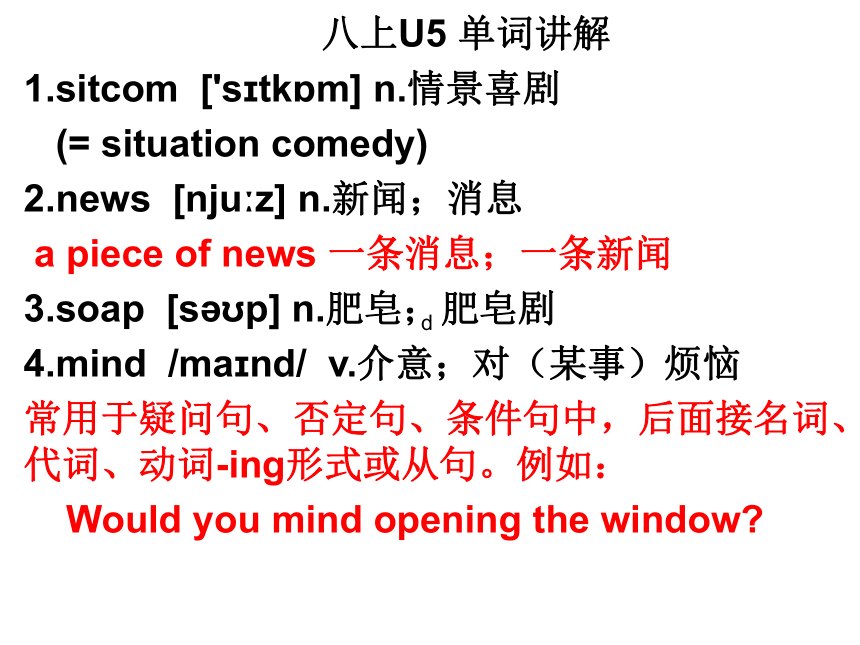
|
|
| 格式 | zip | ||
| 文件大小 | 149.5KB | ||
| 资源类型 | 教案 | ||
| 版本资源 | 人教新目标(Go for it)版 | ||
| 科目 | 英语 | ||
| 更新时间 | 2020-08-08 00:00:00 | ||
图片预览

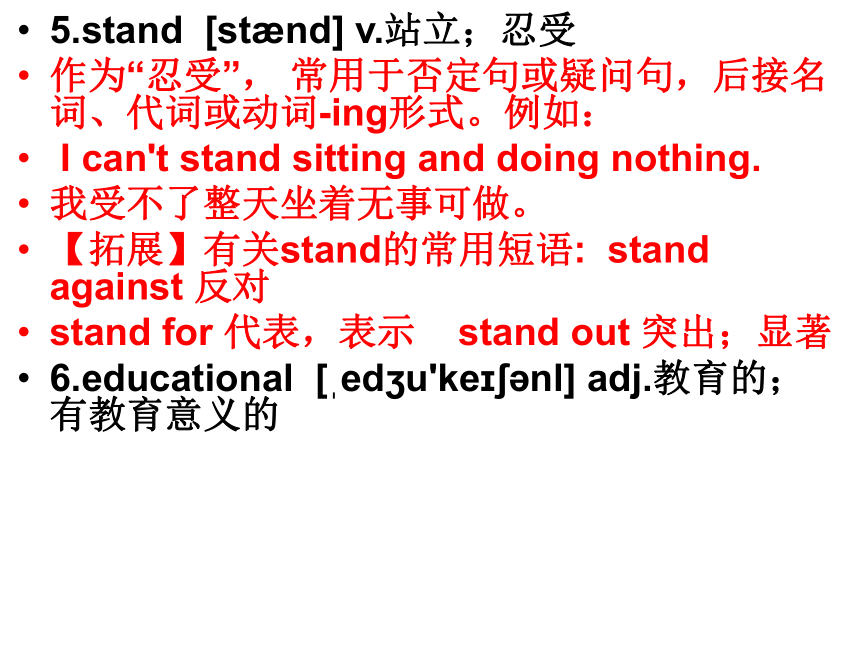
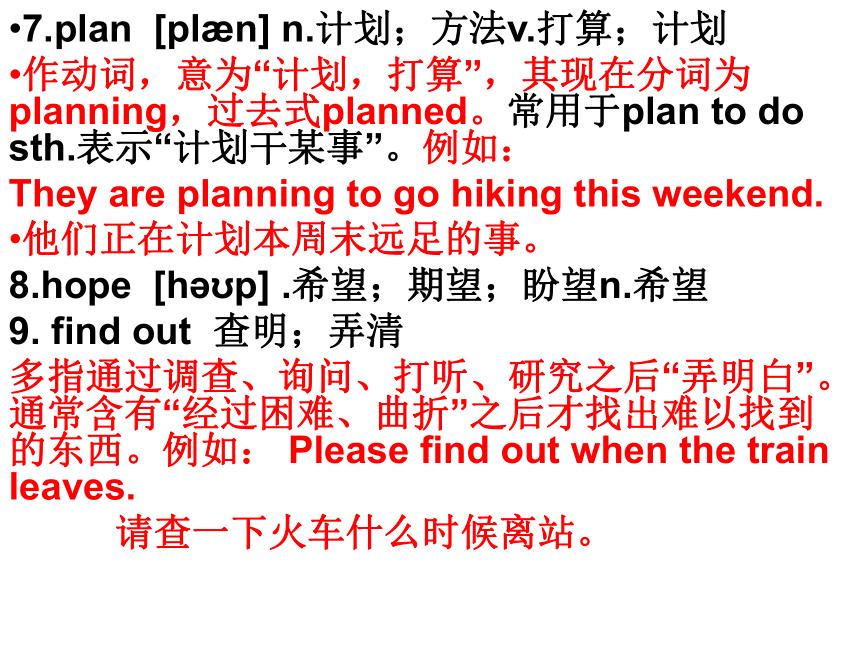
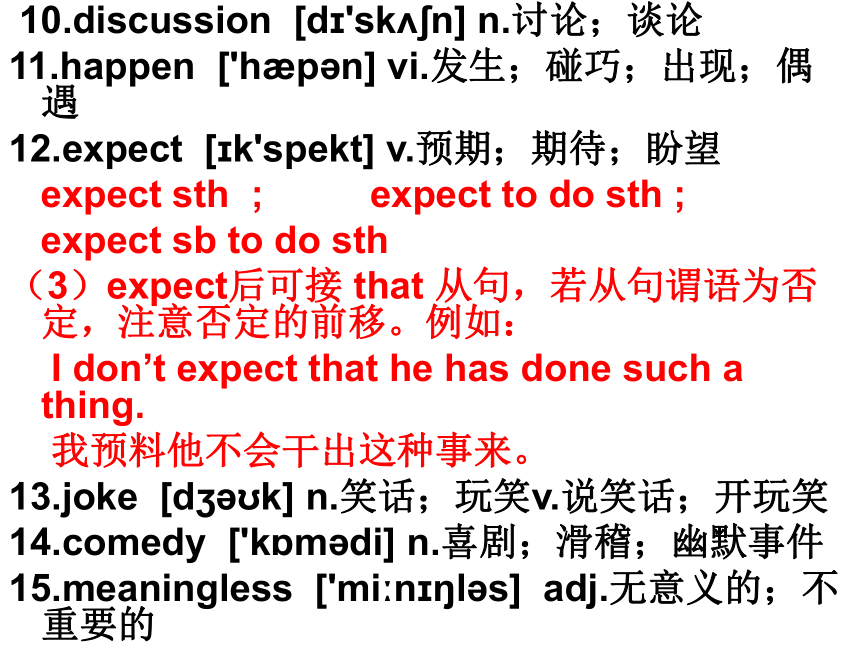
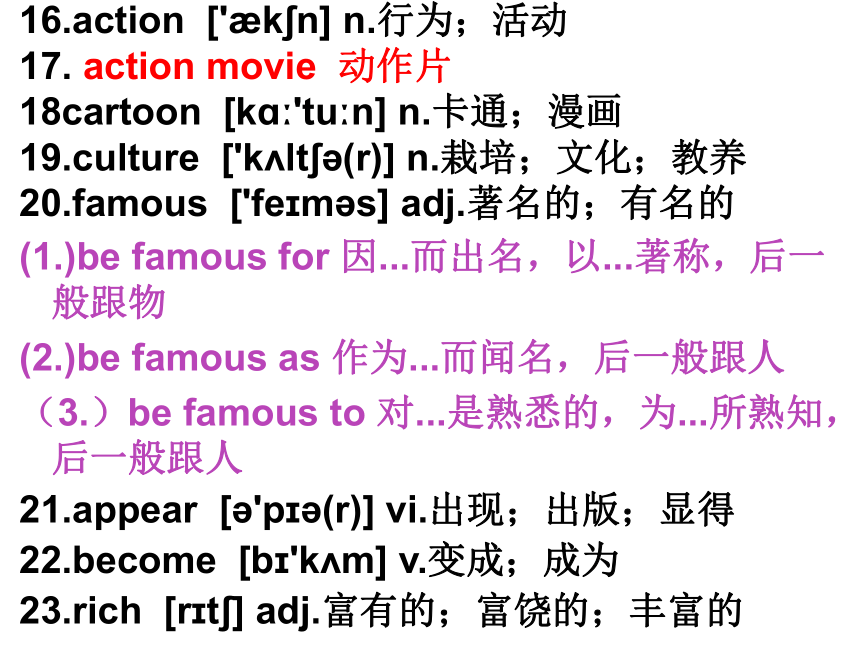
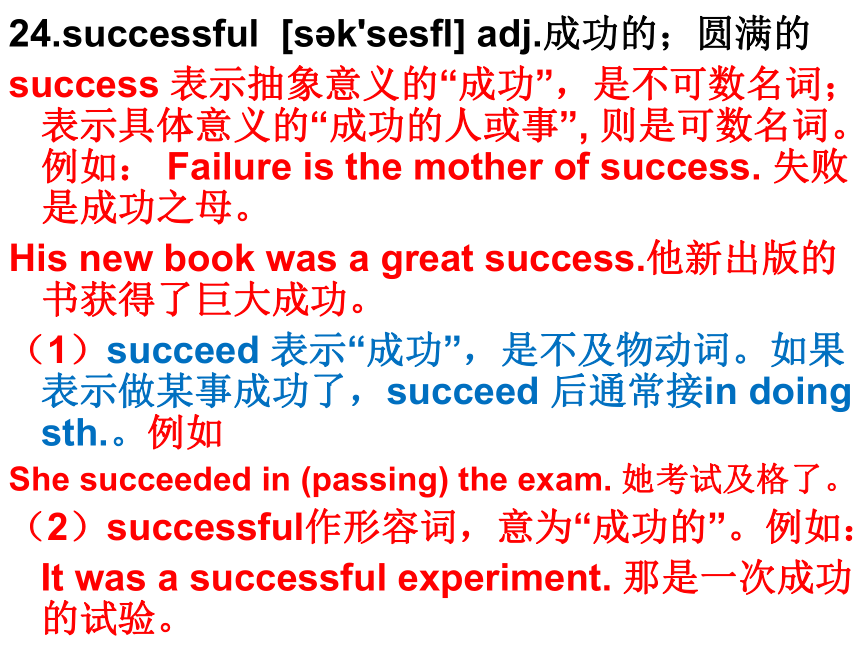
文档简介
(共13张PPT)
八上U5
单词讲解
1.sitcom
['s?tk?m]
n.情景喜剧
(=
situation
comedy)
2.news
[nju?z]
n.新闻;消息
a
piece
of
news
一条消息;一条新闻
3.soap
[s??p]
n.肥皂;肥皂剧
4.mind
/ma?nd/
v.介意;对(某事)烦恼
常用于疑问句、否定句、条件句中,后面接名词、代词、动词-ing形式或从句。例如:
????Would
you
mind
opening
the
window??
d
5.stand
[st?nd]
v.站立;忍受
作为“忍受”,?常用于否定句或疑问句,后接名词、代词或动词-ing形式。例如:
?I
can't
stand
sitting
and
doing
nothing.
我受不了整天坐着无事可做。
【拓展】有关stand的常用短语:
stand
against
反对
stand
for
代表,表示
stand
out
突出;显著
6.educational
[?ed?u'ke???nl]
adj.教育的;有教育意义的
7.plan
[pl?n]
n.计划;方法v.打算;计划
作动词,意为“计划,打算”,其现在分词为planning,过去式planned。常用于plan
to
do
sth.表示“计划干某事”。例如:
They
are
planning
to
go
hiking
this
weekend.
他们正在计划本周末远足的事。
8.hope
[h??p]
.希望;期望;盼望n.希望
9.
find
out
查明;弄清
多指通过调查、询问、打听、研究之后“弄明白”。通常含有“经过困难、曲折”之后才找出难以找到的东西。例如:?Please
find
out
when
the
train
leaves.?
?请查一下火车什么时候离站。
10.discussion
[d?'sk??n]
n.讨论;谈论
11.happen
['h?p?n]
vi.发生;碰巧;出现;偶遇
12.expect
[?k'spekt]
v.预期;期待;盼望
expect
sth
;
expect
to
do
sth
;
expect
sb
to
do
sth
(3)expect后可接
that
从句,若从句谓语为否定,注意否定的前移。例如:
????I
don’t
expect
that
he
has
done
such
a
thing.?
????我预料他不会干出这种事来。
13.joke
[d???k]
n.笑话;玩笑v.说笑话;开玩笑
14.comedy
['k?m?di]
n.喜剧;滑稽;幽默事件
15.meaningless
['mi?n??l?s]
adj.无意义的;不重要的
16.action
['?k?n]
n.行为;活动
17.
action
movie
动作片
18cartoon
[kɑ?'tu?n]
n.卡通;漫画
19.culture
['k?lt??(r)]
n.栽培;文化;教养
20.famous
['fe?m?s]
adj.著名的;有名的
(1.)be
famous
for
因...而出名,以...著称,后一般跟物
(2.)be
famous
as
作为...而闻名,后一般跟人
(3.)be
famous
to
对...是熟悉的,为...所熟知,后一般跟人
21.appear
[?'p??(r)]
vi.出现;出版;显得
22.become
[b?'k?m]
v.变成;成为
23.rich
[r?t?]
adj.富有的;富饶的;丰富的
24.successful
[s?k'sesfl]
adj.成功的;圆满的
success
表示抽象意义的“成功”,是不可数名词;表示具体意义的“成功的人或事”,
则是可数名词。例如:?Failure
is
the
mother
of
success.?失败是成功之母。
His
new
book
was
a
great
success.他新出版的书获得了巨大成功。
(1)succeed
表示“成功”,是不及物动词。如果表示做某事成功了,succeed
后通常接in
doing
sth.。例如
She
succeeded
in
(passing)
the
exam.?她考试及格了。
(2)successful作形容词,意为“成功的”。例如:
???It
was
a
successful
experiment.
那是一次成功的试验。
25.might
[ma?t]
aux.可能;也许;may的过去式
26.main
[me?n]
adj.主要的;最重要的
27.reason
['ri?zn]
n.原因;理由
28.Common
/’
k?m?n/
adj.普通的;常见的
一般的(无比较级)”。例如:
???
It's
a
common
mistake.这是常见的错误。
???
The
flower
is
common
in
spring这种花春天很常见。
29.film
[f?lm]
n.电影
30.unlucky
[?n'l?ki]
adj.倒霉的;不幸的;不吉利的
unlucky是lucky的反义词,意为
“不幸的”。
(1)luck是不可数名词,意为“运气,
好运,
幸运
”。good
luck
to
sb.表示“祝某人好运”,bad
luck意为“倒霉”。例如:
????I
wish
you
luck
=Good
luck
to
you!?
祝你好运!
(2)Lucky作形容词,意为“幸运的”。例如:
???
He
is
a
lucky
dog.
?他是个幸运的家伙。
(3)luckily是副词,意为“幸运地,幸亏,侥幸”。例如:
????Luckily
there
was
a
doctor
on
the
spot.
????幸运的是现场有一位医生。
31.lose
[lu?z]
vt.(lost
/lst/
)丢失;失败vi.失败
32.Girlfriend
/’
g??lfrend/
n.
女朋友
33.ready
['redi]
adj.准备好的;乐意的
(1)get
ready
for意为“为……做准备”,强调动作。例如:
????The
farmers
are
getting
ready
for
the
next
year.农民们正在为明年做准备。
(2)be
ready
for意为“为……做好了准备”,强调状态。例如:They
are
ready
for
the
party.
他们为聚会做好了准备。
?(3)get
sth.
ready意为“把某物准备好”。例如:
???
Please
get
your
school
things
ready.
请把学习用具准备好。
34.
be
ready
to
准备好(做某事);愿意
(做某事)
ready是形容词,意为“有准备的”。be
always
ready
to
do
sth.
表示“乐于做某事”。例如:
?She
is
always
ready
to
help
others.
她总是乐于助人。
【拓展】(1)get
ready
for意为“为……做准备”,强调动作。例如:
?All
the
students
are
getting
ready
for
the
sports
meeting.?所有学生在为运动会做准备。
(2)be
ready
for意为“为……做好了准备”,强调状态。例如:They
are
ready
for
the
party.
他们为聚会做好了准备。
?(3)get
sth.
ready意为“把某物准备好”。
例如:Please
get
your
school
things
ready.
请把学习用具准备好。
35.character
['k?r?kt?(r)]
n.个性;品质;人物;
36.simple
['s?mpl]
adj.简单的;朴素的;单纯的;笨的
38.
take
sb.’s
place
代替;替换
=take
the
place
of
39.army
['ɑ?mi]
n.军队;陆军;一大批
40.do
a
good
job
工作干得好;做得好
37.
dress
up
装扮;乔装打扮
dress
up
as
+sb./sth
装扮成某人/某物
辨析:dress,
put
on,
wear,
have
on
dress
表动作,后常接人作宾语。例如:
?The
boy
can
dress
himself.
那个男孩能自己穿衣服了。
put
on表动作,宾语是衣服、鞋帽袜、手套、眼镜等。
例如:?Put
on
more
clothes
or
you’ll
get
cold.?
????多穿点衣服,否则你会冷的。
wear表状态,宾语范围很广,可以是衣服类名词,还可指佩带首饰、手表、徽章以及留发型、胡须等。例如:
????Miss
Li
is
wearing
a
yellow
dress
today.
????李老师今天穿一件黄色的连衣裙。
have
on是静态,多用于口语。例如:
????She
always
had
a
red
coat
on.
????她总是穿一件红色的外套。
Sarah
萨拉(女名)
Walt
Disney
沃尔特.迪斯尼
Minnie
明妮(女
Mickey
Mouse
米老鼠
Steamboat
Willie
迪士尼公司制作的全球第一部有声动画片《威利号汽船》
Hollywood
好莱坞,美国电影业
the
Hollywood
Walk
of
Fame
好莱坞星光大道(美国)
八上U5
单词讲解
1.sitcom
['s?tk?m]
n.情景喜剧
(=
situation
comedy)
2.news
[nju?z]
n.新闻;消息
a
piece
of
news
一条消息;一条新闻
3.soap
[s??p]
n.肥皂;肥皂剧
4.mind
/ma?nd/
v.介意;对(某事)烦恼
常用于疑问句、否定句、条件句中,后面接名词、代词、动词-ing形式或从句。例如:
????Would
you
mind
opening
the
window??
d
5.stand
[st?nd]
v.站立;忍受
作为“忍受”,?常用于否定句或疑问句,后接名词、代词或动词-ing形式。例如:
?I
can't
stand
sitting
and
doing
nothing.
我受不了整天坐着无事可做。
【拓展】有关stand的常用短语:
stand
against
反对
stand
for
代表,表示
stand
out
突出;显著
6.educational
[?ed?u'ke???nl]
adj.教育的;有教育意义的
7.plan
[pl?n]
n.计划;方法v.打算;计划
作动词,意为“计划,打算”,其现在分词为planning,过去式planned。常用于plan
to
do
sth.表示“计划干某事”。例如:
They
are
planning
to
go
hiking
this
weekend.
他们正在计划本周末远足的事。
8.hope
[h??p]
.希望;期望;盼望n.希望
9.
find
out
查明;弄清
多指通过调查、询问、打听、研究之后“弄明白”。通常含有“经过困难、曲折”之后才找出难以找到的东西。例如:?Please
find
out
when
the
train
leaves.?
?请查一下火车什么时候离站。
10.discussion
[d?'sk??n]
n.讨论;谈论
11.happen
['h?p?n]
vi.发生;碰巧;出现;偶遇
12.expect
[?k'spekt]
v.预期;期待;盼望
expect
sth
;
expect
to
do
sth
;
expect
sb
to
do
sth
(3)expect后可接
that
从句,若从句谓语为否定,注意否定的前移。例如:
????I
don’t
expect
that
he
has
done
such
a
thing.?
????我预料他不会干出这种事来。
13.joke
[d???k]
n.笑话;玩笑v.说笑话;开玩笑
14.comedy
['k?m?di]
n.喜剧;滑稽;幽默事件
15.meaningless
['mi?n??l?s]
adj.无意义的;不重要的
16.action
['?k?n]
n.行为;活动
17.
action
movie
动作片
18cartoon
[kɑ?'tu?n]
n.卡通;漫画
19.culture
['k?lt??(r)]
n.栽培;文化;教养
20.famous
['fe?m?s]
adj.著名的;有名的
(1.)be
famous
for
因...而出名,以...著称,后一般跟物
(2.)be
famous
as
作为...而闻名,后一般跟人
(3.)be
famous
to
对...是熟悉的,为...所熟知,后一般跟人
21.appear
[?'p??(r)]
vi.出现;出版;显得
22.become
[b?'k?m]
v.变成;成为
23.rich
[r?t?]
adj.富有的;富饶的;丰富的
24.successful
[s?k'sesfl]
adj.成功的;圆满的
success
表示抽象意义的“成功”,是不可数名词;表示具体意义的“成功的人或事”,
则是可数名词。例如:?Failure
is
the
mother
of
success.?失败是成功之母。
His
new
book
was
a
great
success.他新出版的书获得了巨大成功。
(1)succeed
表示“成功”,是不及物动词。如果表示做某事成功了,succeed
后通常接in
doing
sth.。例如
She
succeeded
in
(passing)
the
exam.?她考试及格了。
(2)successful作形容词,意为“成功的”。例如:
???It
was
a
successful
experiment.
那是一次成功的试验。
25.might
[ma?t]
aux.可能;也许;may的过去式
26.main
[me?n]
adj.主要的;最重要的
27.reason
['ri?zn]
n.原因;理由
28.Common
/’
k?m?n/
adj.普通的;常见的
一般的(无比较级)”。例如:
???
It's
a
common
mistake.这是常见的错误。
???
The
flower
is
common
in
spring这种花春天很常见。
29.film
[f?lm]
n.电影
30.unlucky
[?n'l?ki]
adj.倒霉的;不幸的;不吉利的
unlucky是lucky的反义词,意为
“不幸的”。
(1)luck是不可数名词,意为“运气,
好运,
幸运
”。good
luck
to
sb.表示“祝某人好运”,bad
luck意为“倒霉”。例如:
????I
wish
you
luck
=Good
luck
to
you!?
祝你好运!
(2)Lucky作形容词,意为“幸运的”。例如:
???
He
is
a
lucky
dog.
?他是个幸运的家伙。
(3)luckily是副词,意为“幸运地,幸亏,侥幸”。例如:
????Luckily
there
was
a
doctor
on
the
spot.
????幸运的是现场有一位医生。
31.lose
[lu?z]
vt.(lost
/lst/
)丢失;失败vi.失败
32.Girlfriend
/’
g??lfrend/
n.
女朋友
33.ready
['redi]
adj.准备好的;乐意的
(1)get
ready
for意为“为……做准备”,强调动作。例如:
????The
farmers
are
getting
ready
for
the
next
year.农民们正在为明年做准备。
(2)be
ready
for意为“为……做好了准备”,强调状态。例如:They
are
ready
for
the
party.
他们为聚会做好了准备。
?(3)get
sth.
ready意为“把某物准备好”。例如:
???
Please
get
your
school
things
ready.
请把学习用具准备好。
34.
be
ready
to
准备好(做某事);愿意
(做某事)
ready是形容词,意为“有准备的”。be
always
ready
to
do
sth.
表示“乐于做某事”。例如:
?She
is
always
ready
to
help
others.
她总是乐于助人。
【拓展】(1)get
ready
for意为“为……做准备”,强调动作。例如:
?All
the
students
are
getting
ready
for
the
sports
meeting.?所有学生在为运动会做准备。
(2)be
ready
for意为“为……做好了准备”,强调状态。例如:They
are
ready
for
the
party.
他们为聚会做好了准备。
?(3)get
sth.
ready意为“把某物准备好”。
例如:Please
get
your
school
things
ready.
请把学习用具准备好。
35.character
['k?r?kt?(r)]
n.个性;品质;人物;
36.simple
['s?mpl]
adj.简单的;朴素的;单纯的;笨的
38.
take
sb.’s
place
代替;替换
=take
the
place
of
39.army
['ɑ?mi]
n.军队;陆军;一大批
40.do
a
good
job
工作干得好;做得好
37.
dress
up
装扮;乔装打扮
dress
up
as
+sb./sth
装扮成某人/某物
辨析:dress,
put
on,
wear,
have
on
dress
表动作,后常接人作宾语。例如:
?The
boy
can
dress
himself.
那个男孩能自己穿衣服了。
put
on表动作,宾语是衣服、鞋帽袜、手套、眼镜等。
例如:?Put
on
more
clothes
or
you’ll
get
cold.?
????多穿点衣服,否则你会冷的。
wear表状态,宾语范围很广,可以是衣服类名词,还可指佩带首饰、手表、徽章以及留发型、胡须等。例如:
????Miss
Li
is
wearing
a
yellow
dress
today.
????李老师今天穿一件黄色的连衣裙。
have
on是静态,多用于口语。例如:
????She
always
had
a
red
coat
on.
????她总是穿一件红色的外套。
Sarah
萨拉(女名)
Walt
Disney
沃尔特.迪斯尼
Minnie
明妮(女
Mickey
Mouse
米老鼠
Steamboat
Willie
迪士尼公司制作的全球第一部有声动画片《威利号汽船》
Hollywood
好莱坞,美国电影业
the
Hollywood
Walk
of
Fame
好莱坞星光大道(美国)
同课章节目录
- Unit 1 Where did you go on vacation?
- Section A
- Section B
- Unit 2 How often do you exercise?
- Section A
- Section B
- Unit 3 I'm more outgoing than my sister.
- Section A
- Section B
- Unit 4 What's the best movie theater?
- Section A
- Section B
- Unit 5 Do you want to watch a game show?
- Section A
- Section B
- Unit 6 I'm going to study computer science.
- Section A
- Section B
- Unit 7 Will people have robots?
- Section A
- Section B
- Unit 8 How do you make a banana milk shake?
- Section A
- Section B
- Unit 9 Can you come to my party?
- Section A
- Section B
- Unit 10 If you go to the party, you'll have a grea
- Section A
- Section B
